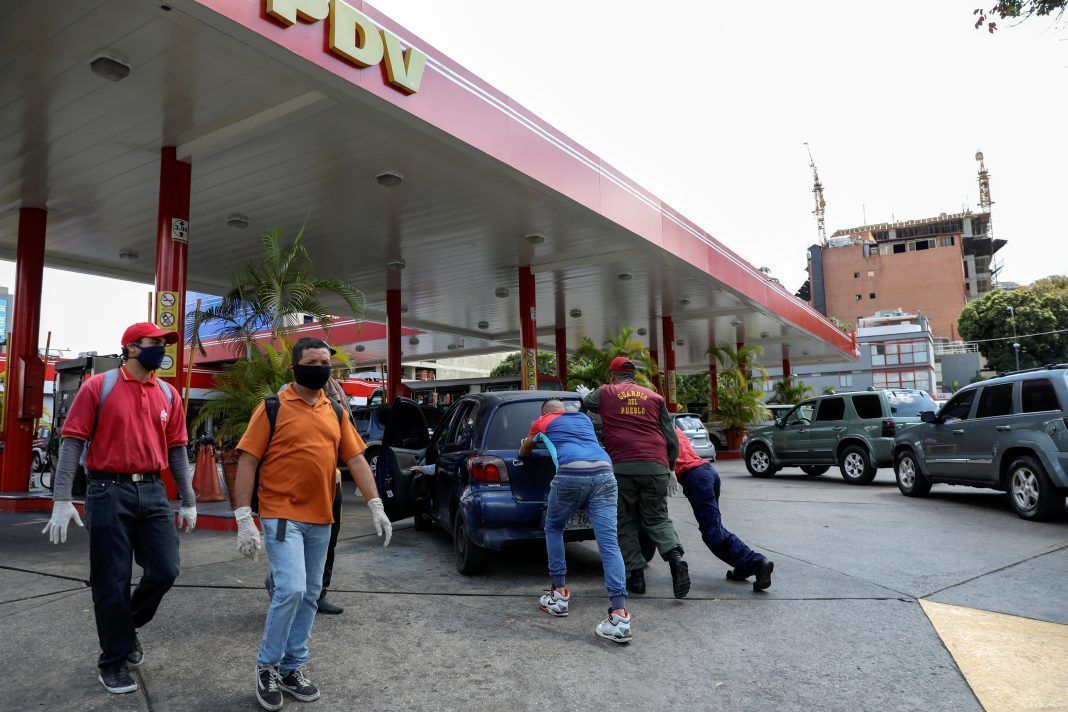By Mayela Armas and Vivian Sequera
CARACAS, May 19 (Reuters) – With the United States weighing a response to a gasoline shipment from Iran to Venezuela, people waiting in line outside service stations in the country’s capital said they were eager to fill their tanks, regardless of how the fuel arrived.
OPEC members Venezuela and Iran both are U.S. adversaries. A Trump administration official said last week the shipment via five tankers – which are still underway to fuel-starved Venezuela – was “unwelcome.”
Some Venezuelan opposition politicians have criticized the shipment due to concerns over socialist President Nicolas Maduro’s ties with Iran.
[aesop_image img=”https://kayhanlife.com/wp-content/uploads/2020/05/2020-04-03T200319Z_1848862851_RC28XF9282S7_RTRMADP_3_HEALTH-CORONAVIRUS-VENEZUELA-scaled.jpg” panorama=”off” credit=”REUTERS/Manaure Quintero” align=”center” lightbox=”on” captionsrc=”custom” caption=”FILE PHOTO: People on motorcycles wait in line in front of a fuel station during the nationwide quarantine due to coronavirus disease (COVID-19) outbreak in Caracas, Venezuela. ” captionposition=”left” revealfx=”off” overlay_revealfx=”off”]
But Franklin Luzardo, a restaurant wait-staff manager who during the coronavirus-related quarantine has been making ends meet doing deliveries, said getting gasoline is what matters.
“I’m not interested in the origin,” Luzardo, 56, told Reuters Tuesday at a gas station in eastern Caracas, where he arrived Monday night. “Without gasoline, the car stops, and that’s the bread on our table.”
Gasoline shortages have grown acute in recent months due to U.S. pressure on suppliers, part of Washington’s “maximum pressure” campaign on Maduro, who has overseen an economic collapse and stands accused of corruption, human rights violations and rigging his 2018 re-election.
Shortages have plagued Venezuela for years due to the collapse of the country’s 1.3-million-barrel-per-day refining network thanks to underinvestment and mismanagement by state oil company Petroleos de Venezuela.
[aesop_image img=”https://kayhanlife.com/wp-content/uploads/2020/05/2019-03-10T171551Z_1396174229_RC1A17775520_RTRMADP_3_VENEZUELA-POLITICS-BLACKOUT-scaled.jpg” panorama=”off” credit=”REUTERS/Carlos Jasso” align=”center” lightbox=”on” captionsrc=”custom” caption=”People queue for fuel at a gas station during the third day of a blackout in Caracas, Venezuela.” captionposition=”left” revealfx=”off” overlay_revealfx=”off”]
“We shouldn’t have had to end up importing gasoline from Iran,” said Coromoto Alvarez, 61, a retired nurse who arrived at a PDVSA gas station in Caracas’ La Bandera neighborhood at 3 a.m. Tuesday.
The shortages have hindered food delivery and left doctors struggling to reach hospitals.
“I don’t care if the gasoline comes from Iran, just that we get it,” said Carmen Rivero, a 35-year-old economist waiting at the La Bandera station. “Without gasoline, food distribution fails, people cannot work.”
[aesop_image img=”https://kayhanlife.com/wp-content/uploads/2020/05/2020-05-19T205420Z_1089751868_RC2WRG9G5VFL_RTRMADP_3_VENEZUELA-GASOLINE-IRAN-scaled.jpg” panorama=”off” credit=”REUTERS/Manaure Quintero/File Photo” align=”center” lightbox=”on” captionsrc=”custom” caption=”FILE PHOTO: Doctors Carlos Martinez and Maria Martinez eat a snack while they wait in line to get fuel at a gas station, during a nationwide quarantine due to the coronavirus disease (COVID-19) outbreak, in Caracas, Venezuela April 7, 2020. ” captionposition=”left” revealfx=”off” overlay_revealfx=”off”]
(Reporting by Mayela Armas and Vivian Sequera in Caracas Writing by Luc Cohen; Editing by Leslie Adler)


